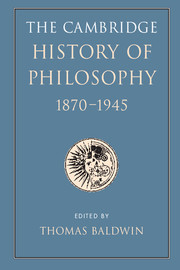Book contents
- Frontmatter
- Contents
- List of contributors
- Introduction
- I 1870–1914
- 1 Positivism, Idealism, and Pragmatism
- 2 Psychology and Philosophy
- 3 Logic, mathematics, and judgement
- 9 Logic: revival and reform
- 10 Foundations of mathematics
- 11 Theories of judgement
- 12 The logical analysis of language
- 4 Philosophy and the new physics
- 5 The idea of social science
- 6 Ethics, politics, and legal theory
- 7 Philosophy of religion and art
- Interlude
- II 1914–1945
- Biobibliographical appendix
- Bibliography
- INDEX
- References
12 - The logical analysis of language
from 3 - Logic, mathematics, and judgement
Published online by Cambridge University Press: 28 March 2008
- Frontmatter
- Contents
- List of contributors
- Introduction
- I 1870–1914
- 1 Positivism, Idealism, and Pragmatism
- 2 Psychology and Philosophy
- 3 Logic, mathematics, and judgement
- 9 Logic: revival and reform
- 10 Foundations of mathematics
- 11 Theories of judgement
- 12 The logical analysis of language
- 4 Philosophy and the new physics
- 5 The idea of social science
- 6 Ethics, politics, and legal theory
- 7 Philosophy of religion and art
- Interlude
- II 1914–1945
- Biobibliographical appendix
- Bibliography
- INDEX
- References
Summary
The aim of this chapter is to chart the emergence and early development, particularly in the works of Gottlob Frege and Bertrand Russell, of a revolutionary approach to the solution of philosophical problems concerning the nature of human understanding, thought, and judgement. That approach has been hugely influential and, perhaps more than any other single factor, has determined the subsequent course of twentieth-century Anglophone, ‘analytic’ philosophy, as a result of the developments and modifications it subsequently underwent in the hands of Wittgenstein, Carnap, Quine, Tarski, Ryle, Davidson, Kripke, Dummett, and those whom they, in their turn, have influenced. Amongst the elements of this new approach to have emerged during the period from 1879 to 1914, emphasis will here be placed on those involving new conceptions of logic, logical analysis, linguistic analysis, meaning, and thought, in the context of an overall anti-psychologism, and a commitment to taking what came to be called ‘the linguistic turn’.
BACKGROUND
The nature of our conceptual, discursive, rational abilities – the nature, that is, of human concepts, ideas, representations, understanding, reason, thought, and judgement – has been a perennial and central focus of philosophical concern since at least the time of Plato. And for over two thousand years, from the appearance of the works comprising Aristotle’s Organon to the publication of Frege’s Begriffsschrift and Grundlagen (Frege 1879, 1884), that concern typically relied upon an intuitively attractive, indeed apparently inescapable set of general assumptions concerning the nature of the phenomena (for a detailed account of this tradition, see Prior 1976).
- Type
- Chapter
- Information
- The Cambridge History of Philosophy 1870–1945 , pp. 174 - 192Publisher: Cambridge University PressPrint publication year: 2003



